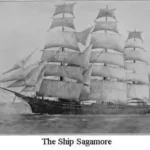 | |
The Monomaniac | |
| Author | Walter McRoberts |
|---|---|
| Published |
1895
|
| Language | English |
| Nationality | American |
| Genre | Poetry, Songwriting |
1895 Short Story
The Monomaniac
The Monomaniac is an English Poetry, Songwriting short story by American writer Walter McRoberts. It was first published in 1895. The Monomaniac is an seafaring adventure story published in McRoberts' collection, Rounding Cape Horn and Other Sea Stories (1895).
The Monomaniac
by Walter McRoberts
The homeward passage from New Zealand is made via Cape Horn, and as westerly winds prevail all over the South Pacific, the craft bound back to the States has everything in her favor. Five weeks had elapsed since the thousand-ton bark Western Belle sailed from Auckland and Wellington for Boston, and on this June morning she was in the South Atlantic, steering a north-easterly course.
It was evidently mid-day, for the captain and mate were squinting at the sun through their sextants; while a young lady stood near, wondering, as she had often done before, how it was possible for such queer-looking instruments to aid in determining their exact position upon so vast an expanse of water.
She was slightly above the medium height, and decidedly pretty, with a fine color in her cheeks. The suns rays and oceans breezes had tanned her fair skin until, as she expressed it, her dearest friends couldnt have told her from a South Sea Islander. A heavy blue flannel dress, sailor blouse, jaunty cap kept in place by a long pin, and rubber-soled tennis shoesthe finest things in the world to keep ones footing in a heavy, seacompleted the picture; and there you have Miss Laura Blake.
What would become of us, Captain, if you and Mr. Bohlman were to fall overboard, or otherwise disappear from the scene? It never occurred to me before, but there would be no one left to bring us into port. Mr. Freeman knows nothing about taking sights.
Miss Blake said this half in jest, half in earnest. The captain regarded it as a good joke.
No, the second mate has never used a sextant, I believe, though he could doubtless navigate the bark for some time by dead reckoning. Meanwhile, my dear young lady, you and Mrs. Evans could study my Epitome, and learn to take the sun yourselves.
The idea of her aunt taking the sun caused a quick smile to overspread Miss Lauras features.
Im afraid the Western Belle would soon run ashore, or go to the bottom, if we women undertook to sail her, she replied. As the widow of a sea-captain, Aunt Sarah believes she knows all about ships, but I fear it would require even more than her nautical knowledge to bring us into port.
Captain Maxwell shared this opinion, but he was far too gallant a man to say so.
Mrs. Evans certainly learned a great deal during the few voyages she made with her husband, and with your assistance, Miss Blake, there is no telling what you might not be able to accomplish. However, both Mr. Bohlman and I are not liable to fall overboard, so you will probably have no chance to distinguish yourselves as navigators.
Though considerably past sixty, and with a head of snowy white hair, no one ever thought of Captain Maxwell as elderly. His dark eyes still shown with the fire of thirty, and every motion of the erect, military figure was surprisingly quick and agile. In ordinary conversation, his words were spoken with an effective deliberation that is none too common now-a-days, while a fine courtly airold fashioned some people called itlent additional dignity to his presence.
Mrs. Evans appeared at this moment emerging from the companionway, and Captain Maxwell hastened to place a chair for the widow of his old friend.
Isnt it a beautiful day, Captain? the lady exclaimed. I cannot recall a more delightful morning.
I agree with you, madam; it certainly is a fine day, although, as your niece says, a trifle cool perhaps.
Possibly. But we are approaching the Line, Laura, and it will become warmer as the bark sails north. For my part, I think this bracing air delightful, and have not regretted returning to Boston in this manner rather than by steamer to San Francisco. It reminds me of the two voyages I made with the late Captain Evans.
The widows good-natured face beamed with amiability and placid content. She was a comely matron, and though not endowed with a great amount of intellect, its absence was in a measure supplied by the charms of a thoroughly feminine and womanly nature.
The ladies had been visiting relatives in Sydney, and had expected to return to America by the Oceanic Liner Monowai. Happening to meet Captain Maxwell on the street one day, he had jokingly proposed that they take passage with him to Boston. Mrs. Evans had known him well in past years, and she instantly regarded the plan with favor. Her niece, however, knew no more of sailing vessels than does the average landsman, who judges all craft of this description by the coasting schooners which he has casually noticed, and had a vague idea that it was flying in the face of Providence to go anywhere in one. Yielding to the joint entreaties of her aunt and Captain Maxwell, and considerably reassured by a view of the Western Belle, she at length consented, and had so far enjoyed the novelty of the trip exceedingly.
Neither do I regret it, Aunt, she said, although it would be agreeable to know about what time we may expect to reach Boston. That is the one drawback to going anywhere on a sailing vesselyou cant tell how long the voyage may last.
The time required to go from New Zealand back to the States does not vary much, the captain answered, and I think I can promise you, Miss Blake, that the trip will not greatly exceed ninety days. We have made a good run nearly every day so far, and ought to pick up the southeast trades next week.
Even if the voyage should require four months, it would be nothing dreadful, Laura. We seamen do not mind a few days more or less, do we, Captain? said the widow.
Carl Bohlman, the portly mate, seemed a little surprised at this reckless disregard of time, while Captain Maxwell stroked his beard and looked rather doubtful.
Perhaps not, madam. Your wide experience enables you to judge of such matters. I remember one time, though, when your late husband had the Davy Crockett, and I commanded the Sunrise, we were racing from Hong Kong to New York; and I can assure you that every minute and every hour were of the utmost importance. We both passed St. Helena on the fifty-eighth day out, but the Sunrise was beaten on the home stretch by twenty-four hours.
How exciting! exclaimed Mrs. Evans. Think of itracing clear around the world! That was before I met my husband, but I have often heard him mention the affair.
It must be dangerous, Aunt. We have the pretty Cape pigeons to race with, which satisfies me perfectly. How sorry I shall be when we see the last of them.
You are timid, Laura, which is excusable in one of your limited experience. You have crossed the Atlantic twice, but running over from New York to Liverpool is a mere bagatelle. Crossing the Pacific is something, to be sure; but when you have doubled both Capes, and crossed the Line six timeswell, then you can lay claim to being a sailor, and will not be easily alarmed.
The widow glanced from one to the other and settled back in her chair with pardonable pride, after giving this account of her achievements. She was rewarded with a bow from Captain Maxwell, who then said:
To change the subject, Mrs. Evans, you must have been very busy this morning. Unless I am mistaken, we have been deprived of your society since breakfast.
That is true, Captain. I have been putting the finishing touches on that rug, which I consider quite an addition to the cabin furniture. After that, I wrote for some timeand ah! that reminds me. I feel certain that the fresh-water tank in the bathroom has again been filled with salt water. While endeavoring to remove an ink-stain from my fingers, I found that the soap made no impression. That careless boy seems unable to remember which tank is for fresh water, and which for salt.
The captain frowned.
This is the second time since leaving port that Dick has made the same mistake. When I have worked out my sights, the matter shall be attended to.
That Dick Lewis needs a ropes end, observed the mate, as soon as Captain Maxwell had gone below, and if the captain would let me, Id give it to him.
There is something peculiar about that boy, said Miss Blake. Sometimes I think his mind is not quite right. You know what a mania he seems to have for fire-works, Aunt. We were not a week out before he was found to have matches and fire-crackers concealed in the forecastle. Then one afternoon not long ago he was discovered in the lazarette, although no one had sent him there.
Thats so, miss; and the captain thought Dick might have been fooling with the signal-lights and rockets. I hardly think that, though. Most likely he was after the eatables.
You can see, Laura, what sort of sailors the future generation of captains will have to contend with. Do you suppose such things ever happened on my husbands ship? Fresh and salt water mixed together, matches and fire-works in the foksl, rockets and signals in the lazarette? Why, it is awful to think of! And the widow shook her head, as she reflected on this extraordinary state of affairs.
That boy in the second mates watch is worth a dozen of this one of mine, Bohlman observed. Freeman predicted he would be the day we divided up the watches, and he was about right. Dont tell him I think so, though.
The second mate had just come on deck, and Miss Blake said mischievously: I shall tell Mr. Freeman what you said unless you promise to rig up a bosuns chair this afternoon, and hoist me up one of the masts.
Ill do it, miss, if you say so, replied Bohlman, though you got scared the other time before you were a quarter of the way up.
Laura, I will not allow such a thing again. What would you think if I were to go aloft and haul over a buntline?
I should laugh, Aunt; I know I should, and Miss Laura did laugh aloud, while the mate turned away to avoid showing his merriment at the comical idea of the widow overhauling buntlines.
But really, Aunt, there is no danger in it, and Mrs. Brassey, in Around the World in the Yacht Sunbeam, speaks of being drawn clear up to the mast-head in a bosuns chair. It is said, also, that Bernhardt climbed the rigging of a steamer one day when on her way to Australia.
Genius is always eccentric, my dear, and may do anything with impunity. But theredinner is served. Let us go.
One could not pass through the barks comfortable cabin without knowing that women were on board. The very arrangement of the chairs showed it. No matter how neat and tasteful a man may beand Captain Maxwell was bothhe can seldom give to a room or dwelling that indescribable air of home-like comfort and domesticity that a clever woman finds it so easy to impart. There was something cheerful in the appearance of the widows open work-box, with its pretty blue lining, and an anchor worked on the inside cover,for Mrs. Evans affected everything nautical,while a large rug or mat made of spun-yarn and sennit bore witness to her skill. The vessels name was neatly worked in the center. Several water-color paintings by Miss Laura ornamented the walls, and a globe of goldfish swung from the ceiling. An upright piano occupied the space between two doors. There was nothing especially elegant or luxurious, as the bark had never been intended for a passenger vessel, but everything was very pleasant and comfortable. The ladies had separate state-rooms, each of which contained but one berth, and was considerably larger than the average state-room on a passenger steamer.
After dinner, Captain Maxwell sent for Dick Lewis to come to the quarter-deck. This boy belonged to the mates watch, which was now off duty. He had not turned in, however, but could be seen with two others of the crew, washing his clothes in the lee scuppers.
It had rained hard the night before, and many of the hands availed themselves of the chance to catch the water for laundry purposes. Two lines were stretched from a starboard backstay to one on the port side, on which were hung shirts of various colors and patterns, patched overalls, towels, socks that had never been mates, and various other articles of apparel.
Dick came aft presently, and stood before the captain; a lanky, unprepossessing youth of sixteen or seventeen. A carroty head of hair, low forehead, white eyebrows and lashes, very pale complexion, and keen blue eyes which constantly shifted aboutthese were the most noticeable points of his appearance.
Dick, said Captain Maxwell, for the second time within two weeks, you have put salt water in the fresh water tank. This must not happen again.
I must have put the funnel in the wrong hole, sir, said Dick, not appearing much abashed.
That is evident. Get a marline-spike from the second mate and then go out on the end of the jib-boom. Stay there and pound the rust off the chains until three bells strike. That may help you to remember. Go forward.
The captain told Mr. Freeman what Dick was to do, and then went below for his nap. Out on the jib-boom, Dick performed his allotted task. What was passing in the boys mind, it would be hard to tell from the expression of his face. Resentment against Captain Maxwell? Scarcely. He seemed rather to be studying over some project. Now his lips moved, as though talking to himself. Then would follow a low chuckle, as of satisfaction at solving some intricate problem. At such moments, his knitted brows became smooth, and the chains were pounded with a vigor that seemed to give a kind of pleasure to the worker. Once or twice his revery was disturbed by a fancied footstep, and he furtively glanced around to see if anyone was watching.
Three bells had struck some little time before a hail from the deck attracted Dicks attention.
Jib-boom, there!
Aye, aye, sir.
Times up, Dick. You must like to pound chains. It was the second mate who spoke.
Dick felt for the foot-ropes, and remembering Mr. Freemans injunction not to let the marline-spike go overboard, he slung it round his neck, and made his way to the deck.
Where are your ears, Dick?
On my head, sir.
No impudence, you lubber! Next time Ill let you work till we make port. Hand over that marline-spike.
Yes, sir. Will you please tell me something, Mr. Freeman?
Maybe so, if I can. The mate says I dont know anything.
I want to know, sir, how you send off those signal-lights, what I was forbid to touch. Are they like Roman candles?
Freeman took hold of the youths arm, and said sternly, Dick Lewis, dont you ever think of those things. Why, d it, youre as crazy as a loon about fire-works! If youve got any more stowed away in the foksl, itll go hard with you. Ive got nothing against you, Dick, but if I hear any more talk like this, its my duty to report to the captain. Youll soon be in irons, at this rate.
I was only fooling, sir. Please dont give me away.
Vast talking, and go below. The watch is half over now.
Dick disappeared into the forecastle, and Freeman meditated for some time over the possible meaning of the boys peculiar talk.
Hell bear watching, he mused. Id better tell Bohlman not to send him into the lazarette, on any account. No, I wont, either; the Dutchmans too dd arrogant, and thinks he knows it all. Id only be told to mind my own business.
Freeman had just reached this decision in regard to Dick, when a Greek sailor called Asso approached, and asked for more bath-brick.
The officer went to see how his watch were getting on with their job of cleaning the paint-work on the deck-houses, and found that buckets of water, swabs, and bath-bricks, were being used to such purpose that the white paint was rapidly assuming the appearance of new-fallen snow. Then there was a section of wire cable to be spliced, and other work to be seen to. Thus the afternoon passed, and Dicks talk about the signals was banished from the second mates mind by the various duties of the hour.
Chapter II.
It was a fine evening. The full moon had risen out of the ocean in matchless splendor, and was rapidly changing its blood-red hues for more silvery tints, as it soared into the cloudless sky.
The captain and passengers were on the quarter-deck, while Mr. Freeman hung over the rail with the comfortable assurance that the bark was making a better run in the second dog-watch than she had in the first, when the mate had been in charge.
I told you, Miss Blake, I should get a good breeze in my watch, and you see Im as good as my word.
So I perceive; and now that you have it, see that it doesnt fail us before morning. Otherwise I shall think your fine breeze all the result of luck. How pleasant it is to hear the water gurgling around the ship.
Eight bells struck, and the dog-watch was over. The wheel and lookout were relieved, and Freeman went below, while Carl Bohlman came on duty to stand the first watch, which lasted until midnight.
What are you thinking of, Aunt? For ten minutes you have not spoken a word.
The beauty of the night has cast a spell over me, Laura, and I was thinking of a favorite poem of mine. I never realized the significance of the first stanza more than on this evening, when we are out on the great ocean with every object bathed in white light.
The dews of summer night did fall, The moon, sweet regent of the sky, Silvered the walls of Cumnor Hall, And many an oak that grew thereby.
Excellent, my dear madam, said Captain Maxwell. You have a fine poetic instinct.
The oaks that grew around Amy Robsarts luxurious prison are replaced here by the barks masts and sails, captain, but the effect is not less beautiful.
A fine conception, Mrs. Evans, but we must remember that it is not summer in these latitudes, even though the dew is gathering, and you may take cold sitting there. Will you take my arm?
With pleasure, captain.
They had paced the deck for some minutes, and the widow was relating some story that seemed greatly to amuse the captain, when the latter stopped suddenly, dropped on one knee, and stared at one of the deadlights near his feet.
Good heavens! How you startled me, captain. Robinson Crusoe couldnt have been more astonished when he saw the footprint in the sand, than you seem to be. What is it?
Worse than a footprint, Mrs. Evans. The moonlight prevented our noticing it sooner. Stand herewhere your shadow falls on this deadlight. [132] Now what do you see?
A light reflected from below. Oh, Laura, the lazarette is on fire!
Captain Maxwell was already disappearing through the hatchway, while the mate and Miss Blake ran up at the widows exclamation. Even the silent figure at the wheel started at the mention of the word fire.
It was but a moment before the master of the bark reappeared, bearing a lighted lantern in one hand.
The cause for alarm is removed, ladies, he said quietly. There is no fire in the lazarette, though nothing short of a miracle prevented it. This lantern was standing on the floor beneath the deadlight and caused the reflection to appear. Mr. Bohlman, have you any idea how it came there?
He spoke with apparent calmness, which Miss Blake readily saw was more feigned than real.
The mate hesitated a moment before answering: Dick must have left it there, sir.
Dick must have left it there! So that bright boy of yours has been in the lazarette again without permission? If I dont have him triced up to the spanker-boom in irons early to-morrow morning, my names not John Maxwell.
He was in the lazarette, sir, but not without permission. I sent him there just before supper to bring up a coil of old rope that was to be ravelled out. He wasnt there ten minutes.
Both ladies glanced at the mate in surprise at these words, and Captain Maxwell looked at his chief officer in a way that was anything but complimentary to the latter. The captain had a temper of his own, which was under excellent control, but he found it necessary to cross the quarter-deck twice before trusting himself to speak.
After that occasion a week ago, when this boy was discovered in the lazarette doing God knows what, I should have thought your own judgment would have prevented your sending him there again. There are plenty of men in your watch, and if none of them knew where this old rope was, you should have gone yourself, rather than let that fool of a boy take a light into such a place.
Bohlman smarted under this speech, though he maintained a discreet silence, knowing it would be useless to attempt to justify himself in the captains present humor. Inwardly, however, he cursed Dick Lewis for having forgotten the lantern, and thus bringing his superiors censure upon himself.
Orders were given for Dick to come aft, and the youth shortly appeared on the quarter-deck for the second time that day in the role of culprit. He quailed before the captains glance, and nervously shifted his old felt hat from one hand to the other.
Do you know why you have been sent for?
Dick pointed to the accusing lantern, and said in a frightened tone: Yes, sir. II remember now I forgot to bring up the lantern whenwhen I fetched the rope.
This was a lie. He had turned the wick low and then left it in the lazarette purposely, knowing well that no one would enter the place after the days work was done. But for the accidental circumstance of its having been placed too near one of the deadlights, the presence of the lantern would never have been suspected.
Do you know what I ought to do with you?
The captains tones were so stern that Dick was hardly able to articulate No, sir.
I ought to take a ropes end and beat you within an inch of your life. Thats what any captain would have done twenty years ago, and what some would do now. You left this light down there among bales of oakum, sennit, old sails, rockets, signal-lights, and other inflammable stuff, and if there had been enough sea running to heel the bark over a trifle more, the lantern would have upset, setting the whole place on fireand we out in the South Atlantic, a good weeks sail from the nearest port!
The captains passion mastered him, and he shook Dick until the boys teeth chattered. Suddenly releasing him, he turned to Mrs. Evans and her niece.
I ought to apologize, ladies, for this outburst; but I lost one ship by fire years ago, and this boy has tried me beyond endurance.
I do not blame you in the least, captain, said the alarmed widow; I feel sure my husband would have inflicted a severe punishment for such an offense. It is as bad as Guy Fawkes and the gunpowder plot.
You see, madam, we officers have to put up with a good deal from sailors now-a-days, said Captain Maxwell, sarcastically. If I punished that boy as he deserved, he would have me arrested the moment we reached port. Then, aided by some unscrupulous lawyer and the testimony of various members of the crew, I should be convicted of cruel and unusual punishment, and fined heavily, or imprisoned. The evidence of yourself and niece might clear me in this case, but all the papers would print articles about the barbarity of captains and mates in general, and the lot of the poor, abused merchant-sailor,forgetting to mention the fact that a vessel, her cargo, and all hands, had narrowly escaped a terrible disaster at the hands of one of these persecuted saints!
Dick, you were warned a week ago that if you entered the lazarette again without permission you would be put in irons. But it seems you had permission, with a glance at the mate,and so we shall have to let you off easier. Go up on the fore royal yard and sit there until the watch ends at midnight.
Dick was unable to repress a sigh of relief as he turned away, but his sharp ears heard Captain Maxwell say to the mate: As soon as it is light enough to-morrow morning to see objects in the lazarette without a lantern, bring up that canister of powder and those four boxes of rockets and signal-lights. They shall be kept in a locker in the cabin during the rest of the voyage. Another thingnever again let that boy go anywhere with a light.
Yes, sir.
The cause of this trouble went forward, muttering to himself: Powder! the captain said powder! I might have found it to-night if they hadnt caught onto the lantern. How did they know it was there, I wonder?
He climbed the fore rigging, unmindful of the taunts of the crew at his second punishment that day, and the captains words kept ringing in his ears.
To-morrow morning theyll all be put where I cant get at em, he muttered, and if only they hadnt found the lantern, I could have got away with some of them rockets to-night. And the powder! I cant do nothing without a lantern, though, and I aint even got a match.
He perched himself upon the royal yard, with a lunatics cunning, inventing various schemes for getting at those fire-works. That was his mania. Although as sane as anyone on other subjects, he was an absolute monomaniac in everything relating to such matters; and since the day when he had overheard a remark relating to the signal-lights and rockets, his fingers had itched to investigate them and see what they were like. Not even the certainty of punishment could stand in his way.
Some people, when they ascend to the roof of a high building, have an almost irresistable desire to leap from it. It is not that they wish to do so, but some strange power seems urging them to it in spite of themselves. Others have a similar feeling when in close proximity to a swiftly-moving railroad train, and require all their will power to keep from casting themselves before the locomotive. So it was with Dick Lewis. He could no more keep his mind off the lazarette and its contents, than steel can resist the influence of a magnet. He sat there as the hours passed, looking ahead into vacancy; thinking and thinking; and imagining just how the rockets must look, as they lay side by side in their boxes down in the midnight darkness of the lazarette. How quiet and silent they were! And yet the touch of a match
He put up a hand before his eyes and turned his head to one side, as though to ward off a blow.
Aunt, we really must go below. It cannot be far from twelve oclock, and we have staid on deck nearly two hours past the usual time.
That is true, Laura; and yet I feel strangely wakeful. But, as you say, it is very late, and high time that we turned in. So good night, captain, and pleasant dreams. Good night, Mr. Bohlman.
Mrs. Evans paused as she reached the companion-way.
How beautiful the moonlight is, she said, so low that no one heard; and from what an awful peril have we this night been delivered.
She slowly followed her niece to the cabin.
Captain Maxwell did not linger long on deck after his passengers had turned in. He, too, usually retired early, and arose at daylight. But the incident of the lighted lantern disturbed him. To the master who has once experienced fire at sea, the mere possibility of another visitation conveys a dread that the worst hurricane cannot inspire. He paced the deck for some time, and then, after a glance aloft, went below.
Midnight came; and the mate was relieved by Frank Freeman, who found his superior in no very pleasant frame of mind.
Youve still got a fair wind, Freeman observed; shes slipping through it in good shape.
I suppose you expected to come on deck and find a dead calm, with me and my watch ahead in the long-boat, towing the bark.
Bohlman left the quarter-deck with this good-natured rejoinder, while the second mate smothered a laugh as he lit his pipe.
Dick climbed down the fore rigging with alacrity, and entered the forecastle with the rest of the port watch. His plans were matured. There was a triumphant light in the boys eyes, and a furtive smile on his ill-favored features as he crept into his bunk and feigned sleep.
A lantern swung from the dingy ceiling, casting a flickering light upon the tiers of bunks, and upon various other objects in the forecastle. There were oilers and rubber boots thrown about here and there, old books without covers, and sea-chests of various patterns. The numerous initials, names, and dates, cut into the walls indicated that the Western Belle had sailed the seas for many years. On one side some one with a talent for drawing had recently executed a chalk picture of the whale swallowing Jonah, which was a marvel of realism. Near this artistic production was tacked a printed card setting forth what rules the crew were expected to obey, what compensation they were to receive, and other matters of like import.
Sea air and insomnia are deadly enemies, and before one bell struck, a chorus of snores assured Dick that his companions were asleep. He suffered a few minutes over the half hour to elapse, and then slipped noiselessly from his bunk. Gliding to the open door, he looked stealthily out. That side of the deck was thrown into shadow by the forecastle, and no one was to be seen but two of the watch on duty slowly walking up and down the main deck, as they conversed in low tones. The others were doubtless on the opposite side of the forward-house.
Dick turned from the door, waited a moment to be sure that all were asleep in the bunks around him, and then produced a towel. Next he took down the lantern from its hook overhead, and wrapped the towel about it so that the light was invisible. That done, he made for the door,stepped out on deck,and crept forward in the shadow of the building.
Upon reaching the corner, he stopped and listened The distant murmur of voices was heard on the opposite side of the house, but the moonlit stretch of deck ahead was untenanted. Apparently no one was about the extreme forward part of the vessel except the lookout. The boys unshod feet made no sound as he darted across the strip of moonlight that fell between the forward-house and the forecastle deck. Now he was standing by the open fore hatch.
In large sailing vessels that stand well out of water, it is customary to leave the fore hatch off at all times unless some very severe gale is threatened. The forecastle deck overhead prevents rain or salt water from entering, and as it is often necessary to go down to the fore peak half a dozen times a day, it would be a useless trouble to move the hatch-cover each time. This was the case with the Western Belle.
Dick well knew he could not enter the lazarette at the customary place without being seen by the man at the wheel and the officer on duty, and had conceived the laborious, but perfectly feasible plan, of descending through the fore hatch to the tween-decks, and then crawling aft over the cargo the whole length of the vessel to accomplish his purpose.
Without losing time, he placed his foot upon the first step of the flight of stairs that led down to the fore peak, and then rapidly descended. It was black as Erebus when he reached the bottom, and before taking another step he uncovered the lantern and stuffed the towel in his pocket. Cautiously walking over old sails, ropes, barrels, casks, etc., the boy was soon out of the fore peak proper, and at that part of the tween-decks where the cargo began to be stowed.
The foremast looming up ahead gave him quite a start, and a sort of dread possessed him at thought of the long distance to be traversed in that profound darkness. Dick had not realized until now the magnitude of the task before him, but he only wavered a second, and pushed on.
It soon became impossible to walk, and he dropped on his hands and knees, creeping along on all fours; at the same time holding the handle of the lantern between his teeth. Its rays illumined but a short space in front, though they served to make the gaunt deck-beams assume all sorts of strange and fantastic shapes that he could not help noticing. Thus he crawled along over bales of flax and tow, boxes of Kauri gum and sacks of horns; picking his way carefully, and impatiently wondering how far he had progressed. This was at length made plain, thou







